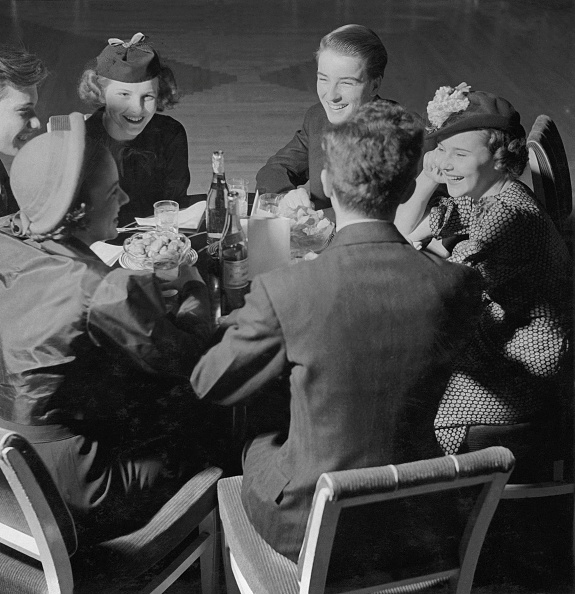Editor’s Note: This excerpt is from Etiquette for Young Moderns, a book originally published in 1954 . While the advice is geared towards teens, it also applies to those older “children” who have moved back in with mom and dad!
“What are ‘at-home’ manners?” you may ask. “I’m not expected to jump out of my chair every time Mom goes through the room, am I — or to forgo the best part of my lamb chop when the rest of the family picks up the bones with their fingers?”
Of course not. But “informal” manners are quite different from no manners at all! Remember when, in the foreword of this book, etiquette is defined as “a way of showing that you’re thoughtful of the other fellow”? Well, at home, particularly, good manners are exactly that. The “veneer” side of courtesy counts for little; considerateness, cooperativeness, dependability, and a pleasant disposition are the “Big Four” contributions expected of you.
More specifically:
DO keep your room clean and uncluttered. Nothing is more discouraging to Mom, when she brings in your laundry, than to find an unmade bed, a desk cluttered with papers, and your clothes scattered over every spare inch of chair and floor space. Your room, as your private domain, is also your responsibility. Remember that, and do a good job in the maintenance department.
DO put things back where they belong — in any part of the house. If you’ve borrowed the screwdriver, return it to Dad’s tool chest, Mom’s scissors to her sewing basket, your own coat to the coat closet. It’s irritating to have to hunt for “lost” articles, and just as irritating to have to constantly tidy up a constantly-cluttered up living room.
DO respect the privacy of the other members of your family. Knock before entering their bedrooms, and never barge into the bathroom without knocking. And, while on the subject of the bathroom, be careful not to monopolize it during rush hours (usually early in the morning, and before and after meals); be considerate of the hot water supply, if limited; don’t borrow personal articles; always leave the wash basin neat and clean; and leave your laundry to soak only with Mom’s permission.
DO show up promptly at meal time. This, together with a few cheerful topics for conversation, is all it takes to make Mom feel that her labors in the kitchen have been worthwhile — although a “Gosh, this is good!” upon occasion certainly wouldn’t do any harm.
DO help with the household chores — cheerfully and willingly. Disappearing at dish-washing time just isn’t good sportsmanship. And you won’t be a “sucker,” either, if you do more than your share of the menial jobs. If you volunteer to clean up the kitchen alone when Sis wants to catch an early movie, she’ll do the same for you another time. And an unrequested car-polishing job from time to time is “good politics.”
DO listen to the suggestions and criticisms of your parents. Remember that, in some areas at least, their experience is broader than yours, and that you can benefit by it. Talking back accomplishes nothing; talking out your problems and differences, on the other hand, accomplishes a great deal. Many families have found that a good way to do this is to organize a Family Council — where the whole family meets regularly to discuss problems, air “gripes,” and make plans that will affect the entire group. Everyone has a chance to speak, as well as listen, and where differences of opinion crop up, the issue is decided by democratic vote. Mutual rights and responsibilities are adjusted in these meetings and, over a period of time, a regular Family Council can become the core of a harmonious, well-adjusted household.
DON’T borrow anything from another member of the family without first obtaining the owner’s permission. You know how you feel when you’ve agreed to play tennis with a friend, and dash home for your racquet — only to discover that your brother has “borrowed” it for the afternoon. And it’s always when you’re sure “Sis won’t mind” that she really does!
DON’T monopolize the phone, radio, or TV set. If there are family conflicts in the TV-program department, talk them over calmly, and be willing to compromise in order to reach a peaceful solution. Perhaps you could all take turns as TV-program chooser, or let each member of the family do the deciding at certain hours or on certain evenings. And when you’re playing records or watching TV, keep the volume low enough so as not to disturb any other family members who may be reading or talking at the other end of the room.
Above all, remember that, after a quarrel, you owe your fellow family member an apology — just as if he were anyone else. And “Thank you’s” and “Excuse me’s” are just as important in your private life as they are in public.
In short, to get along with others in the best possible way, you have to be your best possible self. And isn’t the happiest possible home a goal well worth working for?






